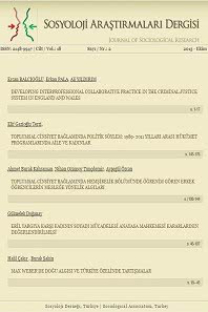KÜRESELLEŞME VE TÜRKİYE'DE KIRSAL KADININ ÜCRETLİ EMEĞİ: RAPANA VENOSA ÜRETİM ZİNCİRİ ÜZERİNDEN BATI KARADENİZ BÖLGESİNDE BİR VAKA ANALİZİ
Karadeniz Bölgesi'nin kırsal kesimlerinde kadınlar işgücüne genellikle yoksulluğu hafifletmek adına katılmaktadır. Rapana Venosa (deniz salyangozu) üretimi, özellikle kırsal kadınların istihdam edildiği sektörlerden biridir. Bu çalışmada deniz salyangozu üretim zincirinde toplumsal cinsiyete dayalı işbölümü olgusu ve ücretli işin kadın işçilerin toplumsal statüsü üzerindeki etkisi feminist bir yaklaşımla incelendi. Veriler Sinop-Dikmen ve Samsun-Çarşamba ilçelerinde iki salyangoz işleme fabrikasının sahipleri, yöneticileri ve kadın işçileri ile yapılan derinlemesine mülakatlar ve katılımsız gözlem yoluyla derlendi. Bulgular, küresel üretim zincirinin, ücretli işlerde çalışarak kendilerine özerk alan yaratmaya yönelik yeni stratejiler geliştiren kırsal kadınların esnek, görünmeyen - dolayısıyla ucuz - emeğine dayandığınave kadın emeğin değersizliğine yönelik toplumsal algıyı yeniden ürettiğini yansıtmaktadır
GLOBALIZATION AND RURAL WOMEN'S WAGE LABOR IN TURKEY: A CASE STUDY OF RAPANA VENOSA PRODUCTION CHAIN IN WESTERN BLACK SEA REGION
In rural Black Sea communities in Turkey, women are often engaged with paid work to mitigate poverty. Rapana Venosa (veined rapa whelk) production is one of the sectors that rural women are especially employed. In this study, gender division of labour in the global production chain of veined rapa whelk and its implication for women's social satus were examined from a feminist perspective. Data were collected through in-depth interviews with owners, managers and women workers of whelkprocessing factories in two villages of Sinop-Dikmen and Samsun-Çarşamba districts and non-participatory observation. Research findings suggest that the flexible global production chain of rapa whelk depends on rural women's informal and cheap labour and thus reproduces the invisibility of women's labour and women's secondary status
___
- Berik, G. ve Çağatay, N. (1991). Transition to Export-led Growth in Turkey: Is There a Feminisation of Employment. Capital and Class. 43: 153-177.
- Boserup, E. (1970). Women's Role in Economic Development. New York: St. Martin's Press.
- Braverman, H. (1974). Labour and Monopoly Capital: The Degradation of Work in the Twentieth Century. New York: Monthly Review Press.
- Dayıoğlu, M. ve Kırdar, M. (2010). Determinants of and Trends in Labour Force Participation of Women in Turkey. State Planning Organization of the Republic of Turkey and World Bank Welfare and Social Policy Analytical Work Program. Working Paper Number: 5. Ankara: Devlet Planlama Teşkilatı ve Dünya Bankası Yayınları. s.52.
- Dünya Bankası. (2007). (Dünya Bankası Raporu: Gelişim İçin Tarım. Washington: The World Bank Press.
- Ertürk, Y. (1998). Kırsal Türkiye'de Cemaat, Gelenek ve Değişme Eğilimleri. T. Bulutay (Der.) Türkiye'de Tarımsal Yapı ve İstihdam içinde (s. 95-123). Ankara: Devlet İstatistik Enstitüsü.
- Ertürk, Y. (2004). Considering the Role of Men in Gender Agenda Setting: Conceptual and Policy Issues. Feminist Review. 78: 3-21.
- Fröbel, F., Heinrichs, J. ve Kreye, O. (1980). The New International Division of Labour: Structural Unemployment in Industrialised Countries and Industrialisation in Developing Countries. Cambridge: Cambridge University Press.
- Gündüz Hosgör, A. ve Smits, J. (2007). The Status of Rural Women in Turkey: What is the Role of Regional Differences. Val Moghadam (Der.), Empowering Women: Participation, Rights and Women's Movements in the Middle East, North Africa, and South Asia içinde (s.180-202). Syracuse: Syracuse University Press.
- Gündüz Hosgör, A. ve Smits, J. (2008). Variation in Labor Market Participation of Married Women in Turkey. Uluslararası Kadın Çalışmaları Forumu. 31: 104-117.
- Gündüz Hoşgör, A. (2010). Türkiye'de Kırsal kadının Toplumsal Konumu: Bölgesel Eşitsizlikler, Yasal Müdahaleler ve Kısmi Kazanımlar. Koç Üniversitesi 2008 Toplumsal Cinsiyet Konferans Kitabı içinde (s. 295-314). Istanbul: Koç Üniversitesi Yayını.
- Harding, S. (1986). The Science Question in Feminism. Ithaca, London: Cornell University Press.
- Hartmann, H. (1981). The Unhappy Marriage of Marxism and Feminism: Towards a More Progressive Union. Lydia Sargent (Der.), The Unhappy Marriage of Marxism and Feminism içinde (s.1-41). Londra ve Sidney: Pluto Press.
- Kambhampati, U. (2005). Development and the Developing World. Cambridge: Polity Press.
- Moghadam, V. (1992). Development and Women's Emancipation: Is There a Connection? Development and Change. 23(4): 215-255.
- Neis, B. (2005). Changing Tides: Gender, Fisheries and Globalization. Canada: Fernwood Publishing.
- Ramazanoğlu, C. ve Holland, J. (2002). Feminist Methodology: Challenge and Choices. London: Thousand Oaks and New Delhi: Sage Publications.
- Suzuki Him M. ve Gündüz Hoşgör A.(değerlendirmede), Japonya Pazarı ile Türkiye Karadeniz arasındaki Küresel-Kırsal Bağlantı: Rapana Venosa'nın Metalaşma Süreci Vaka Analizi. Toplum ve Bilim.
- Tiano, S. (1987). Gender, Work, and World Capitalism: Third World Women's Role in Development. Beth Hess, vd. (Der.) Analysing Gender: A Handbook of Social Science Research içinde (s.93-8 ). Beverly Hills: Sage Publications.
- Thomas, A. ve Potter, D. (1992). Development, Capitalism and the Nation State. Tim Allen, Alan Thomas (Der.), Poverty and Development in the 1990s içinde (s.116-144). Oxford: Oxford University Press.
- ISSN: 2148-9947
- Yayın Aralığı: Yılda 2 Sayı
- Başlangıç: 2010
- Yayıncı: Sosyoloji Derneği
Sayıdaki Diğer Makaleler
PERSPECTIVES ON THE EVOLUTION OF FEMINISM THROUGH MODERNIZATION AND ISLAM IN TURKEY
Ayşe GÜNDÜZ HOŞGÖR, Miki SUZİKİ HİM
TÜRKİYE'DE SAĞLIK HİZMETLERİNİN DÖNÜŞÜMÜ
TÜRKİYE’DE SAĞLIK HİZMETLERİNİN DÖNÜŞÜMÜ
"ORTA SINIF"LARIN FARKLI KESİTLERİ: SINIF GEÇMİŞİ, KÜLTÜR PRATİKLERİ VE MESLEKİ STATÜ
Irmak KARADEMİR HAZIR, Sibel KALAYCIOĞLU, KEZBAN ÇELİK
META VE GÖSTERİ OLARAK KURUMSAL SOSYAL SORUMLULUK: MARXİST BİR ELEŞTİRİ
Eren KARACA AKBAŞ, Çağatay TOPAL
Ayşe GÜNDÜZ HOŞGÖR, Miki SUZİKİ HİM
